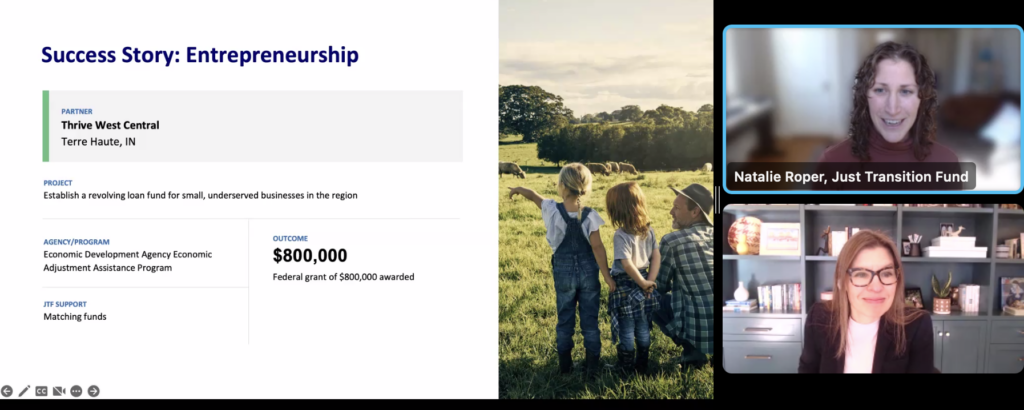Yesterday the Interagency Working Group on Coal and Power Plant Communities and Economic Revitalization (Energy Communities IWG) hosted the third and final webinar in its “Technical Assistance for Energy Communities” webinar series. This series was dedicated to highlighting federal and non-federal technical assistance opportunities available to energy communities and providing guidance on how to access them.
“Many energy communities don’t know where to start when it comes to identifying and applying for financial assistance to support revitalization, and many do not have the capacity to manage various opportunities at one time. That’s where technical assistance comes into play,” said Energy Communities IWG executive director Brian Anderson, Ph.D. “Technical assistance provides targeted support and guidance to communities and organizations facing development challenges. The goal of the webinar series was to expose communities to the breadth of technical assistance programs available and make them more easily accessible.”
Webinar recap:
The first webinar, held on January 10, 2023, featured Bettina Jones from the Appalachian Regional Commission who discussed the READY Appalachia program and Christine Sorensen from the U.S. Department of Agriculture Rural Development who highlighted the Rural Partners Network. READY Appalachia is a community capacity building initiative offering flexible funding to organizations in four key economic development pillars: nonprofits, community foundations, local governments, and Local Development Districts. The Rural Partners Network is a collaboration among 20 federal agencies, departments and commissions meant to improve access to government resources, staffing and tools by working directly with local leaders.
“READY Appalachia was born out of work we’ve done at the Appalachian Regional Commission for years now. We have worked in capacity building but not at this scale before… we serve what we like to call the four pillars of economic development in the region: nonprofits, local governments, community foundations, and local development districts. These are our four key partners in our work in the region and we wanted to invest in the capacity of these four types of institutions,” said Jones.
“We were able to research and design Rural Partners Network with an equitable lens and by having these conversations with rural communities as to what they need,” said Sorensen. “They talk about local job creation; they talk about infrastructure, not just the hard structures to be built like roads or buildings, but it was really around “how can we build leadership?”; and then also community improvement… That was our call to action.”
U.S. Department of Transportation’s Mariia Zimmerman and U.S. Environmental Protection Agency’s Bruce Binder, Ellen Tarquinio and Sahar Rana led the conversation at the second webinar, held on January 17, 2023. The speakers spotlighted the Thriving Communities Initiative, Environmental Justice Thriving Communities Centers Program, Technical Assistance Services for Communities Program and water infrastructure technical assistance. The Thriving Communities Initiative supports communities with planning and project development of transformative infrastructure projects. The Environmental Justice Thriving Communities Centers Program provides grant funding to establish technical assistance centers across the nation to provide training, and related support to communities with environmental justice concerns. The Technical Assistance Services for Communities Program provides independent assistance to help better understand the science, regulations and policies of environmental issues and EPA actions.
“There’s a lot of money that’s available for water infrastructure. More than [the EPA] ever had before to the tunes of many billions of dollars… we’re focused on disadvantaged communities, Tribal communities, rural communities and trying to give them a fair share of all of this money that’s out there through the Bipartisan Infrastructure Law and Inflation Reduction Act,” said Tarquinio.
“With all of the new funding created in the Bipartisan Infrastructure Law, including many discretionary grant programs that local governments, units of government, nonprofits and others can directly apply for, [DOT] is revamping our approach to technical assistance and standing up a number of new resources and opportunities,” said Zimmerman.
These opportunities can be accessed on the new DOT Navigator.
Finally, the third webinar was held on January 24, 2023. Nicole Manapol and Sukhwindar Singh from Rural Communities Action Partnership (RCAP) and Heidi Binko and Natalie Roper from the Just Transition Fund (JTF) talked about available technical assistance from their respective organizations. Between these organizations, energy communities across the nation have access to critical programs that support economic and community revitalization.
“[RCAP’s] purpose is to elevate rural voices and build local capacity to improve quality of life… While water has been the core of what we do, over the years our work has evolved to meet communities where they are in their array of needs including community wealth building, housing, lending… and more recently disaster recovery and climate mitigation,” said Manapol.
“[JTF has] an asset-based theory of community economic development which means that you build from the assets of a place. Through our work we are trying to find the local visionaries, local entrepreneurs, workforce development and economic experts who have a vision for their local community and have ideas on how they want to scale,” said Binko.
In addition to featured speakers, the series also highlighted new opportunities available through the IWG website including the clearinghouse, website resources, and technical assistance.
Established by an Executive Order during President Biden’s first week in office, the IWG is pursuing a whole-of-government approach to create good-paying union jobs, spur economic revitalization, remediate environmental degradation and support energy workers in coal, oil and gas, and power plant communities across the country. The IWG supports the Administration’s goals of a carbon emission-free electricity sector by 2035 and economy-wide net-zero emissions by 2050.

 )
or https:// means you’ve safely connected to
the .gov website. Share sensitive information only on official,
secure websites.
)
or https:// means you’ve safely connected to
the .gov website. Share sensitive information only on official,
secure websites.

